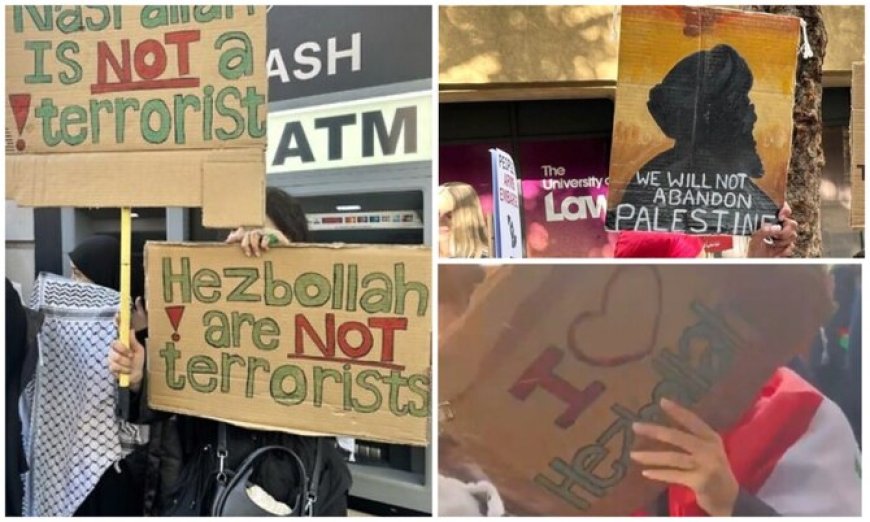Western Double Standards on Free Speech: Pro-Hezbollah Signs Criminalisation
Once further highlighting the inconsistencies in Western attitudes towards freedom of speech and political dissent, the current debate in the UK over placards with pro-Hezbollah chants at pro-Palestine demonstrations in London exposes The criticism of such events by Science Secretary Peter Kyle on them as a "criminal act" draws attention to a larger pattern whereby some political solidarity expressions—especially those related to Middle Eastern causes—quickly be reviled or even criminalised.

Once further highlighting the inconsistencies in Western attitudes towards freedom of speech and political dissent, the current debate in the UK over placards with pro-Hezbollah chants at pro-Palestine demonstrations in London exposes The criticism of such events by Science Secretary Peter Kyle on them as a "criminal act" draws attention to a larger pattern whereby some political solidarity expressions—especially those related to Middle Eastern causes—quickly be reviled or even criminalised.
Although the UK government has banned Hezbollah as a terrorist group and labels both of its political and military factions under this name since 2019, this broad categorisation is sometimes attacked for lacking complexity. Originally established in the early 1980s, Hezbollah has been a major political actor with parliamentary seats in Lebanon as well as a military opposition tool against Israeli occupation. Although the company is quite divisive, calling all kinds of support for it as "criminal" ignores the complicated geopolitical reality of the area and the several motives why people can gather behind it.
Particularly in view of the recent Israeli offensive in Gaza and increased Middle Eastern tensions, protestors carrying similar posters in London most certainly did so as part of a more general message of sympathy with Palestine. Although the UK's prohibition on Hezbollah implies that overt support for the group is illegal, this begs issues about the limits of free expression in a nation that values pluralism and tolerance. Why is political communication, especially in regard to divisive worldwide concerns like the Israeli-Palestinian conflict, selectively regulated?
Fundamentally, the UK's ban of pro-Hezbollah reflects a more general Western contradiction. Many times, Westerners who oppose foreign governments or support anti-establishment movements in other countries are praised as advocates of freedom. However, these same people are quickly labelled as criminals or radicals when they show solidarity with groups or causes judged objectionable by the government.
Given the larger background of Middle Eastern politics, this selective application of the law is even more clear-cut. Hezbollah's popularity in some areas of Lebanon and the larger Arab world stems from its opposition to Israeli occupation, which speaks to those who view Israel's actions in Gaza and the West Bank as illegal and violent. The UK government is effectively criminalising the expression of an anti-imperialist stance—a viewpoint that has great historical and political relevance—by criminalising support for Hezbollah, especially in view of Western engagement in the conflicts of the area.
As the conflict between Israel and Hamas gets more intense, the pro-Hezbollah signs observed at the recent demonstrations fit a larger wave of discontent in the UK. The nation has seen hundreds of arrests following over 2,600 demonstrations over the Israeli-Palestinian issue over the previous year. These demonstrations mirror the great divides in British society, where many people are progressively critical of the West's uncompromising support of Israel, especially in relation to its conduct in Gaza.
But the UK government has decided to restrict some kinds of expression rather than encouraging a more honest communication about these conflicts. Although Prime Minister Keir Starmer has urged unity and denounced any encouragement of hate, his government's actions imply a considerably more limited conception of what qualifies as appropriate expression. Though lumping honest political criticism of Israel or professions of solidarity with Palestine under the umbrella of hate speech only helps to restrict critical debate, Starmer's warnings against "vile hatred" targeting Jews and Muslims are surely relevant.
The government's position on pro-Hezbollah signals is indicative of a more general problem as tensions boil both in the Middle East and inside the UK: the West's refusal to interact with the complexities of the Israeli-Palestinian conflict. The UK should promote a more complex and educated debate on the underlying reasons of the conflict, the function of groups like Hezbollah, and the effects of Western foreign policy in the area instead than criminalising opposition. True democracy, after all, celebrates letting controversial ideas be voiced and discussed rather than stifling them.
Ultimately, the West's limited approach to free expression merely widens gaps and fosters more animosity. The UK government has to do more than just police downing of demonstrators if it really wants to solve the growing tensions and create stronger communities—it must pay attention to the issues motivating people to the streets.













































